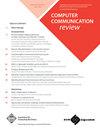Zeph & Iris map the internet
IF 2.8
4区 计算机科学
Q3 COMPUTER SCIENCE, INFORMATION SYSTEMS
引用次数: 2
Abstract
We describe a new system for distributed tracing at the IP level of the routes that packets take through the IPv4 internet. Our Zeph algorithm coordinates route tracing efforts across agents at multiple vantage points, assigning to each agent a number of /24 destination prefixes in proportion to its probing budget and chosen according to a reinforcement learning heuristic that aims to maximize the number of multipath links discovered. Zeph runs on top of Iris, our fault tolerant system for orchestrating internet measurements across distributed agents of heterogeneous probing capacities. Iris is built around third party free open source software and modern containerization technology, thereby presenting a new model for assembling a resilient and maintainable internet measurement architecture. We show that carefully choosing the destinations to probe from which vantage point matters to optimize topology discovery and that a system can learn which assignment will maximize the overall discovery based on previous measurements. After 10 cycles of probing, Zeph is capable of discovering 2.4M nodes and 10M links in a cycle of 6 hours, when deployed on 5 Iris agents. This is at least 2 times more nodes and 5 times more links than other production systems for the same number of prefixes probed.Zeph & Iris绘制互联网地图
我们描述了一个新的系统,用于在IP级别上对数据包通过IPv4互联网的路由进行分布式跟踪。我们的Zeph算法在多个有利位置协调跨代理的路由跟踪工作,根据其探测预算为每个代理分配若干/24个目的地前缀,并根据旨在最大化发现的多路径链接数量的强化学习启发式方法进行选择。Zeph运行在Iris之上,Iris是我们的容错系统,用于跨异构探测能力的分布式代理编排互联网测量。Iris是围绕第三方免费开源软件和现代容器化技术构建的,因此提供了一种用于组装弹性和可维护的internet度量体系结构的新模型。我们表明,仔细选择从哪个有利位置进行探测的目的地对优化拓扑发现很重要,并且系统可以根据先前的测量了解哪个分配将最大化总体发现。经过10个周期的探测,当部署在5个Iris代理上时,Zeph能够在6小时的周期内发现2.4万个节点和10M个链接。对于相同数量的前缀,这至少是其他生产系统的2倍多的节点和5倍多的链接。
本文章由计算机程序翻译,如有差异,请以英文原文为准。
求助全文
约1分钟内获得全文
求助全文
来源期刊

ACM Sigcomm Computer Communication Review
工程技术-计算机:信息系统
CiteScore
6.90
自引率
3.60%
发文量
20
审稿时长
4-8 weeks
期刊介绍:
Computer Communication Review (CCR) is an online publication of the ACM Special Interest Group on Data Communication (SIGCOMM) and publishes articles on topics within the SIG''s field of interest. Technical papers accepted to CCR typically report on practical advances or the practical applications of theoretical advances. CCR serves as a forum for interesting and novel ideas at an early stage in their development. The focus is on timely dissemination of new ideas that may help trigger additional investigations. While the innovation and timeliness are the major criteria for its acceptance, technical robustness and readability will also be considered in the review process. We particularly encourage papers with early evaluation or feasibility studies.
 求助内容:
求助内容: 应助结果提醒方式:
应助结果提醒方式:


